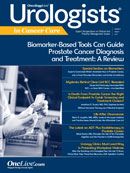Enzalutamide + Sipuleucel-T Gives Immune Boost in mCRPC
Sipuleucel-T (Provenge), an immunotherapy tailor-made for men with metastatic castration-resistant prostate cancer (mCRPC) using their own white blood cells, is just as potent if it is manufactured while a patient is taking enzalutamide (Xtandi), and the two drugs seem to boost immunity more effectively when administered together.
Daniel P. Petrylak, MD
Sipuleucel-T (Provenge), an immunotherapy tailor-made for men with metastatic castration-resistant prostate cancer (mCRPC) using their own white blood cells, is just as potent if it is manufactured while a patient is taking enzalutamide (Xtandi), and the two drugs seem to boost immunity more effectively when administered together, according to preliminary data from a phase II study.
The early results of the ongoing STRIDE trial, or study P12-2, were published in conjunction with abstracts from the Annual Meeting of the American Society of Clinical Oncology, held this spring in Chicago, Illinois.
Sipuleucel-T is an autologous cellular immunotherapy; enzalutamide is an androgen receptor inhibitor. Both are approved for the treatment of men with mCRPC, authors Quinn et al pointed out.
“Given the lack of potential cross resistance and data suggesting that androgen ablation may potentiate the immunotherapeutic effects of vaccines, combining these agents may be a beneficial treatment approach for mCRPC,” the authors hypothesized.
In the study, patients with asymptomatic or minimally symptomatic mCRPC received sipuleucel-T with enzalutamide dosed at 160 mg per day for 52 weeks. The men were randomized 1:1 to either the concurrent arm of the trial, in which enzalutamide was started 2 weeks before sipuleucel-T was initiated, or the sequential arm, in which enzalutamide was begun 10 weeks after sipuleucel-T was initiated.
The primary endpoint was the peripheral T cell immune response to the immunizing antigen PA2024, and an exploratory endpoint was time to prostateâ€specific antigen (PSA) recurrence. As of January 14, 2013, 22 patients had been enrolled, with 6 (3 in each arm) having completed sipuleuel-T treatment, the authors reported.
Investigators found no differences in product potency between trial arms.
“The median cumulative CD54 upregulation (a measure of antigen†presenting cell [APC] activation) was 35.3 vs 26.6 and CD54+ cell counts were 1.9 vs 1.8 x109 in arms A and B, respectively,” the authors wrote. “In all patients, APC activation was greater at infusion 2 vs 1 indicating an immunologic prime boost. Pre†and postâ€culture cellular composition did not differ between the arms.”
The authors concluded that sipuleucel-T can be manufactured while a patient is taking enzalutamide without a change in the drug’s anticipated potency, and that, when given concurrently with enzalutamide, sipuleucel-T is delivered with an “immunologic prime boost.”
Reference
Quinn DI, Petrylak DP, Pieczonka CM, et al. A randomized phase II, open-label study of sipuleucel-T with concurrent or sequential enzalutamide in metastatic castration-resistant prostate cancer. Presented at: the Annual Meeting of the American Society of Clinical Oncology; May 29-June 2, 2014; Chicago, Illinois. Abstract e16071^.




